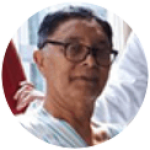
Parkinson’s Disease/ Syndrome
Parkinson’s Disease is a degenerative disorder of the central nervous system, causing movement disorder characterized by motor* and non-motor** symptoms. Parkinson’s disease treatment for each patient is different and is based on his or her symptoms and needs.
Parkinson’s Disease primarily affects neurons in an area of the brain that regulates the movements of other body parts. Some of these dying neurons produce dopamine, a chemical that sends messages to the part of the brain that controls movement and coordination. As Parkinson’s disease progresses, the amount of dopamine produced in the brain decreases, leaving a person unable to initiate and regulate movement normally.
Cardinal motor symptoms :
- Rigidity (stiffness of limbs and trunk)
- Bradykinesia (slowness of movement)
- Tremor of hands, arms, jaw, legs, and face
- Postural instability
Non-motor symptoms :
- Loss of sense of smellConstipationRapid eye movement
- Sleep behavior disorder
- Mood disorders
- Excessive saliva
- Difficulty speaking and swallowing
- Slowed thinking
- Depression
Management at AktivHealth :
1. Early/Mild PD – Middle/ Moderate PD
Preventative and Restorative Rehab Goals:
- Regular special exercises to improve/maintain motor performance, optimizing strength, mobility, flexibility, range of motion (ROM), balance, locomotion, endurance, and perceived quality of life by using various techniques like PNF, MRP, LSVT, functional strengthening, and balance.
- Speech and oral muscle control program to improve speech and swallowing.
- Maintenance of optimal nutrition
- Support Group classes to improve/maintain socialization, positive outlook and life purpose.
Compensatory Advice includes:
- Patient/family/caregiver education about the disease process, rehabilitation, energy conservation
- Determine the need for adaptive or assistive devices
- Determine the need for environmental modification of home/workplace
- Provide psychological support with early referral to support groups for patient and family/caregiver
- Referral to other health care professionals as needed.
2. Late/ Advanced PD
Preventive Rehab Goals:
- Maximize upright posture, out-of-bed time
- Maximize participation in activities of daily living
- Prevention of contractures, pressure wounds, pneumonia, and so forth
- Maintenance of optimal nutrition.
Compensatory Advice includes:
- Family/caregiver education and training: safety education, transfers, positioning, turning, skin, bladder and bowel care.
- Psychological support for patient and family/caregiver.







